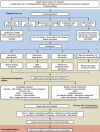Treatment resistant hypertension--investigation and conservative management
- PMID: 25008301
- PMCID: PMC4095581
- DOI: 10.3238/arztebl.2014.0425
Treatment resistant hypertension--investigation and conservative management
Abstract
Background: The introduction of invasive treatments, some of which are irreversible, for the entity called treatment-resistant hypertension (TRH) creates the need for a comprehensive discussion of the diagnostic evaluation that TRH requires and the available options for its conservative treatment.
Method: The pertinent literature is selectively reviewed in the light of the authors' longstanding clinical experience.
Results: Our review of the literature suggests that the high prevalence of TRH in Germany (ca. 20%) can be nearly halved with the aid of more thorough diagnostic evaluation. Such an evaluation should include a review of the patient's antihypertensive drugs (adherence, daily dosing, concomitant medication), investigation for other vascular changes that might affect blood pressure measurement, and exclusion of white-coat hypertension, sleep apnea syndrome, and secondary rather than essential hypertension. As there have been no randomized trials of treatment for TRH, the physician confronted with such cases must devise treatments on the basis of observational data and pathophysiological reasoning (volume status considering renin levels, sympathetic blockade, vasodilatation). Such measures can presumably lower the number of truly treatment-resistant cases still further.
Conclusion: To save patients from preventable harm, patients should undergo a thorough diagnostic evaluation and-under close monitoring for side effects-conservative pharmacological and nonpharmacological treatments should be deployed before any invasive treatment is performed.
Figures
Comment in
-
Better risk assessment for individual substances.Dtsch Arztebl Int. 2015 Feb 13;112(7):120. doi: 10.3238/arztebl.2015.0120a. Dtsch Arztebl Int. 2015. PMID: 25780871 Free PMC article. No abstract available.
-
In reply.Dtsch Arztebl Int. 2015 Feb 13;112(7):120. doi: 10.3238/arztebl.2015.0120b. Dtsch Arztebl Int. 2015. PMID: 25780872 Free PMC article. No abstract available.
References
-
- Krum H, Schlaich M, Whitbourn R, et al. Catheter-based renal sympathetic denervation for resistant hypertension: a multicentre safety and proof-of-principle cohort study. Lancet. 2009;373:1275–1281. - PubMed
-
- Esler MD, Krum H, Sobotka PA, Schlaich MP, Schmieder RE, Bohm M. Renal sympathetic denervation in patients with treatment-resistant hypertension (The Symplicity HTN-2 Trial): a randomised controlled trial. Lancet. 2010;376:1903–1909. - PubMed
-
- Scheffers IJ, Kroon AA, Schmidli J, et al. Novel baroreflex activation therapy in resistant hypertension: results of a European multi-center feasibility study. J Am Coll Cardiol. 2010;56:1254–1258. - PubMed
-
- Bisognano JD, Bakris G, Nadim MK, et al. Baroreflex activation therapy lowers blood pressure in patients with resistant hypertension: results from the double-blind, randomized, placebo-controlled rheos pivotal trial. J Am Coll Cardiol. 2011;58:765–773. - PubMed
-
- Calhoun DA, Jones D, Textor S, et al. Resistant hypertension: diagnosis, evaluation, and treatment. A scientific statement from the American Heart Association Professional Education Committee of the Council for High Blood Pressure Research. Hypertension. 2008;51:1403–1419. - PubMed
Publication types
MeSH terms
Substances
LinkOut - more resources
Full Text Sources
Other Literature Sources
Medical
Research Materials


